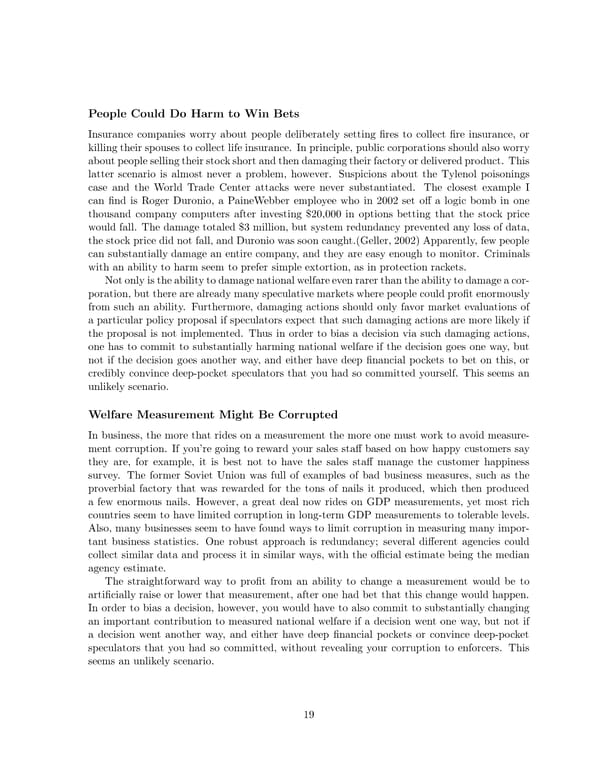People Could Do Harm to Win Bets Insurance companies worry about people deliberately setting fires to collect fire insurance, or killing their spouses to collect life insurance. In principle, public corporations should also worry aboutpeoplesellingtheirstockshortandthendamagingtheirfactoryordeliveredproduct. This latter scenario is almost never a problem, however. Suspicions about the Tylenol poisonings case and the World Trade Center attacks were never substantiated. The closest example I can find is Roger Duronio, a PaineWebber employee who in 2002 set off a logic bomb in one thousand company computers after investing $20,000 in options betting that the stock price would fall. The damage totaled $3 million, but system redundancy prevented any loss of data, the stock price did not fall, and Duronio was soon caught.(Geller, 2002) Apparently, few people can substantially damage an entire company, and they are easy enough to monitor. Criminals with an ability to harm seem to prefer simple extortion, as in protection rackets. Notonlyistheabilitytodamagenationalwelfareevenrarerthantheabilitytodamageacor- poration, but there are already many speculative markets where people could profit enormously from such an ability. Furthermore, damaging actions should only favor market evaluations of a particular policy proposal if speculators expect that such damaging actions are more likely if the proposal is not implemented. Thus in order to bias a decision via such damaging actions, one has to commit to substantially harming national welfare if the decision goes one way, but not if the decision goes another way, and either have deep financial pockets to bet on this, or credibly convince deep-pocket speculators that you had so committed yourself. This seems an unlikely scenario. Welfare Measurement Might Be Corrupted In business, the more that rides on a measurement the more one must work to avoid measure- ment corruption. If you’re going to reward your sales staff based on how happy customers say they are, for example, it is best not to have the sales staff manage the customer happiness survey. The former Soviet Union was full of examples of bad business measures, such as the proverbial factory that was rewarded for the tons of nails it produced, which then produced a few enormous nails. However, a great deal now rides on GDP measurements, yet most rich countries seem to have limited corruption in long-term GDP measurements to tolerable levels. Also, many businesses seem to have found ways to limit corruption in measuring many impor- tant business statistics. One robust approach is redundancy; several different agencies could collect similar data and process it in similar ways, with the official estimate being the median agency estimate. The straightforward way to profit from an ability to change a measurement would be to artificially raise or lower that measurement, after one had bet that this change would happen. In order to bias a decision, however, you would have to also commit to substantially changing an important contribution to measured national welfare if a decision went one way, but not if a decision went another way, and either have deep financial pockets or convince deep-pocket speculators that you had so committed, without revealing your corruption to enforcers. This seems an unlikely scenario. 19
 Shall We Vote on Values, But Bet on Beliefs? Page 20 Page 22
Shall We Vote on Values, But Bet on Beliefs? Page 20 Page 22